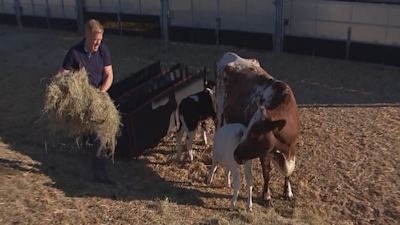'The grass is all gone' - Countryfile farmer Adam Henson on struggle to survive during drought

Watch Countryfile's Adam Henson talk about the impact of the drought on farming in the West Country
A lack of grass to feed livestock, a lower quality of crop and animals which are not growing quickly enough are just some of the issues facing farmers this summer.
A sustained period of dry weather has seen a drought officially declared in parts of the South West today.
Adam Henson, who is known for presenting 'Adam's Farm' on Countryfile, told ITV's GMB his farm in the Cotswolds is one of many feeling the effects of the heatwave.
"The grass is completely parched," he said. "It's all gone."
It means his animals are being fed using winter stocks, which will have a knock-on effect on the farm's running costs later this year and into 2023.
He said: "We cut hay and silage during the summer and we store that and then feed it to the cattle and sheep in the winter when the grass stops growing.
"It's stopped growing now, so we are feeding our winter stocks - and that's the same across the south of the country."
Cattle on Adam's farm are also producing less milk as they use more energy trying to keep cool in the heat.
In July, his farm in the Cotswolds saw just 10% of the rain it usually gets at that time of year - meaning some crops failed to grow while those that did were often poor quality.
He said: "The drought has had a significant impact, the lack of rain - we've had about 8mm of rain, we usually expect around 80mm in July.
"With our winter wheat crop, for instance, we've had the yield, but what we haven't got is the quality because of the lack of moisture, the grain quality isn't there.
"We grow wheat for producing bread, it's milling wheat and it hasn't made the spec. That has had a knock-on effect to the equivalent of £15,000 which is significant."
He said the farming industry now needs to adapt to prepare for future dry spells.
"It does seem like this isn't a one-off," Adam said. "Talking to climate experts and meteorologists - they're saying that this is going to have a recurring effect on the environment.
"In farming, we are going to have to adapt. We need to think about the crops that we're growing, how we're growing them, different varieties and different types of crops because food security is so essential.
"If you think about the travesty that's going on in Ukraine, and how that's effected us with our energy and food crisis, food security needs to be at the top of the government's agenda."
For some farmers, it is not just the income from crops and livestock which is being impacted by the heat but also tourism income.
Adam said the hot weather means people are choosing to go to the water to cool down, rather than go on holiday in the countryside.
He told ITV: "The farm is struggling due to the heat, but so is our tourist enterprise. People tend to go to the river or seas, rightly or wrongly.
"We are about 900 feet above sea level we have a nice cool breeze so it is fairly pleasant going around the animals.
"Although we are busy during the summer holidays we are not as busy as we would like to be."